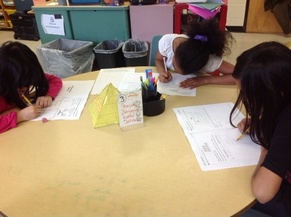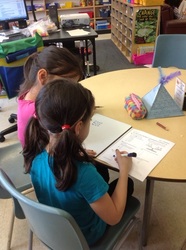 writing a mock test in Ms. Teschow's room
writing a mock test in Ms. Teschow's room Since the week-long assessment is standards-based, one might argue that one is "prepping” all year, or not prepping at all, since -- in theory -- the test is based on the provincial curriculum expectations for that division, which we should all have been teaching anyway. But of course, we all know that there’s more to the test than the standards on which it’s based.
In Ontario, the test has become so high stakes that people buy and sell houses based on schools’ published results. You can imagine the kind of pressure that surrounds such an assessment, when the real estate market depends on it!!! So yes, I do “prepare” my students, and here’s how I do it....
especially if they pay attention in class, participate in learning activities, and choose to
do homework when needed.
When it comes up in classroom conversation early in the year, I don’t make a big deal about it. By December, we’ve completed at least one math and one reading
passage from a previous year’s test (these are available online, here -- you have to scroll down a bit.)
Usually, the math pieces are done in a strand-specific context. So, for example, if we are working on transformational geometry, I might pull out a question or two from a previous
year's test, relevant to geometry. After we've worked on them, I mention in passing that they are from EQAO. Reading passages are used in a small group, guided reading context.
Since many of the students have never actually responded to a multiple choice test, we
spend some time on that, too, considering different skills and strategies that may be helpful when completing this sort of a task.
Over the March Break, I send home a language booklet and a math booklet from previous years. I show the students the booklets, and point out that these are pretty much what they will look like for the actual test (just with different questions, obviously).
Around this time, too, I begin including student exemplars from questions we are completing in small groups, especially in reading. After reading a passage, we deconstruct the question using highlighters, then students respond individually. Next, they highlight their responses, deconstructing the various sections, so that they can see if
indeed they've done everything the question asked of them. Finally, I ask them to look at the exemplars and consider which one their response is most like, and why. Then we talk as a small group about what they can do to improve their response, and they do.
The students feel pretty good once they've each experienced Level 3 or 4 success. Now
success. Now they know they can do it!
Now we do a "mock" test, where I copy either a Language or a Math booklet, or both, from the EQAO website, and tell students they will have about 45 minutes to work on this, independently. (Independently means they can work alone, or with a partner, but they cannot get up and walk around or come ask me questions.) This is a critical component of EQAO prep in my room, since I rarely use pencil and paper tests as a from of assessment in my program, so many of my students have had very limited test-taking experience.
We talk about how to manage oneself if one completes a section well before everyone else -- the students come up with all kinds of great ideas, including having their literacy bin on hand, freshly stocked with a number of interesting books to keep them entertained.
Now is also when I remind them that for the actual test, most of them will be working alone in the classroom, and those of them who often work with another teacher may be going to another room to work on the computer or at a small table with that teacher. In addition to this procedural explanation, I give them a very explicit "pep talk" about doing one's best, and about how a student who works really hard and "only" gets a level 2 is in some sense doing better than a kid who is super smart in Language and Math, but who only pulls off a level 3, because he didn't really bother trying.
The last thing I do a few weeks before the test is check in one on one with students who continue to exhibit anxiety about the impending assessment. And there are a few who really need this. Case in point, the child I chatted with in the library this afternoon, because I have noticed how anxious he gets when having to answer a math question under pressure, and also he's mentioned to me that he is feeling really nervous about "the test". I reminded him this afternoon about how well he does when playing a math game with a partner, or talking about how he solved a problem in math, and how he turned his level 2 answer on a reading task into a level three, just but adding some specific details in the text that illustrated his explanation on a question. He told me about how he gets stressed when things are loud, and people are moving around a lot, and I assured him that during the test, it would be quiet, and that the relaxing music he enjoys would be playing softly in the background. His body was noticeably more relaxed when he left the room after our conversation.
Soon enough, the first day of EQAO arrives. The Ziploc bags, pencils, and math manipulatives are at the ready, as are water bottles, fruit, and other healthy snacks. The students enter the room, an nervous excitement filling the air. For an hour a day over the next 6 days, the students work silently to show what they know.
They do their best, then we pack up the test, send it off, and celebrate another successful school year!





 RSS Feed
RSS Feed